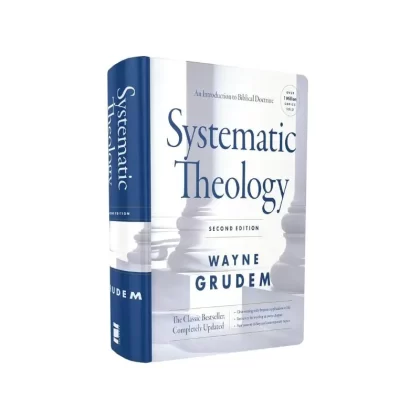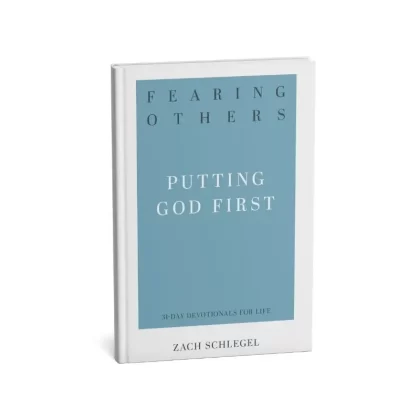Table of Contents
- Lament Is Not Complaining—It’s an Act of Faith
- Lament as a Faith Builder: How Sorrow Can Deepen Your Relationship with God
- Using Dark Clouds, Deep Mercy: How This Book Guides You Through Lament
I (Ryan) am turning forty tomorrow, and honestly, I need comfort in grief. It’s not because I am now over the hill. On my 40th birthday, I will attend the funeral of my college roommate, a dear friend, and a brother in Christ. Oh, how I long for comfort in grief. I grieve for my friend’s sweet wife, their three little children, and his sweet family. “Lord, how long?” laments the psalmist in Psalm 40—a cry of honest desperation. The psalmist was lamenting — a biblical way of handling the emotions, the questions, the doubts, and the tears. A biblical manifestation of grief that many, including myself, don’t fully understand.
Yet, I am thankful for Mark Vroegop‘s book, Dark Clouds, Deep Mercies: Discovering the Grace of Lament, which has helped me better understand lamentations. Here are a few things I’ve taken away.
Lament Is Not Complaining—It’s an Act of Faith
One of the biggest misunderstandings about lament is that it’s just complaining. Many Christians believe that expressing sorrow to God shows a lack of faith. But biblical lament is not about whining or grumbling—it’s about bringing your pain before the Lord with honesty and trust. Lament acknowledges suffering but refuses to let it drive you away from God. Instead, it draws you closer to Him.
Throughout the Psalms, godly men like David cry out in distress, questioning God and expressing deep sorrow. Yet, their lament always leads back to trust in God’s character. Vroegop explains that lament is a form of worship—an act of faith that says, “I don’t understand, but I still turn to You.” When you lament, you’re not accusing God of wrongdoing; you’re asking Him to move in your pain.
Lament Is Not Weakness—It’s Strength in Surrender
In a culture that values self-sufficiency, admitting deep sorrow can feel like weakness. You may feel pressure to “stay strong” or “move on” quickly after a loss. But true strength is found in surrendering your pain to God, and lament is the biblical way to do that.
Lament doesn’t mean giving up or wallowing in despair—it’s a courageous step of faith. It means acknowledging that life is broken, that suffering is real, and that you need God’s help. Many of us try to suppress grief, hoping it will fade over time. But unprocessed sorrow doesn’t disappear; it lingers, affecting our hearts and relationships in unseen ways. Lament allows you to process grief in a healthy way—one that leads to deeper dependence on God rather than emotional numbness or bitterness.
When Jesus wept over Lazarus in John 11, He didn’t ignore the pain of loss or pretend it wasn’t devastating. If the Son of God Himself lamented, why should we push past sorrow without expressing it? Comfort in grief isn’t found in pretending you’re okay—it’s found in bringing your brokenness to God and trusting Him to sustain you.
Lament Is Not a Lack of Hope—It Leads to Hope
Another misconception about lament is that it focuses too much on sorrow and not enough on hope. But lament is actually a bridge between pain and trust. Without lament, grief can feel like a dead-end road, leading only to despair. Biblical lament, however, provides a pathway forward.
Vroegop highlights the four steps of lament: turning to God, bringing complaints, asking boldly, and choosing to trust. Each step moves you toward deeper reliance on God, even when answers don’t come immediately. Lament isn’t about staying stuck in sadness—it’s about allowing sorrow to lead you to God’s promises.
Look at Lamentations 3, where Jeremiah pours out his grief over the destruction of Jerusalem. He doesn’t minimize the suffering around him, but in the middle of his lament, he declares:
“The steadfast love of the Lord never ceases; His mercies never come to an end; they are new every morning” (Lamentations 3:22-23).
Jeremiah’s pain was real, but so was his hope. That’s the power of biblical lament—it allows you to grieve deeply while still clinging to God’s faithfulness. If you’re struggling to find comfort in grief, lament gives you a way to hold onto hope even when life feels unbearable.
Embracing Lament as Part of Your Faith
Lament is not complaining, weakness, or hopelessness—it’s an invitation to trust God in the middle of suffering. If you’ve hesitated to express your sorrow to God, Dark Clouds, Deep Mercy will help you see lament as a gift, not a burden. It’s a way to bring your pain before God without fear, knowing He welcomes your honesty and walks you through the darkest valleys.
If you’re grieving, don’t be afraid to lament. Let your grief guide you toward healing and lead you back to the unshakable hope found in Christ.

Lament as a Faith Builder: How Sorrow Can Deepen Your Relationship with God
When you face deep sorrow, it’s easy to feel like your faith is slipping away. You might wonder where God is and why He allows suffering or even hears your prayers. But biblical lament—honest, raw, and desperate cries to God—can strengthen your faith rather than weaken it. In Dark Clouds, Deep Mercy, Mark Vroegop explains that lament is not the opposite of faith but a deep expression of trust in God. When you lament, you are choosing to take your pain to Him rather than turning away in despair.
Lament Draws You Closer to God, Not Further Away
When grief overwhelms you, the temptation is to withdraw—from people, from prayer, and even from God. But lament is an invitation to draw near to Him, bringing your real, unfiltered emotions into His presence. The Bible is filled with examples of godly men and women who cried out to God in their pain—David, Jeremiah, Job, and even Jesus. They didn’t sugarcoat their feelings or pretend everything was fine. Instead, they poured out their hearts, trusting that God was still listening, still present, and still good.
Lament reminds you that faith isn’t about having all the answers—it’s about holding onto God in the middle of uncertainty. When you bring your sorrow to Him, you acknowledge He is still sovereign, even when life feels broken. This deepens your relationship with Him by keeping communication open rather than shutting it down in bitterness.
Trust Grows in the Tension Between Pain and Promise
Lament doesn’t ignore the reality of suffering, but it also doesn’t stop there. Biblical lament holds sorrow in one hand and God’s promises in the other. It acknowledges the tension between what you feel and what you know to be true. You may feel abandoned, but Scripture tells you that God will never leave you. You may feel like evil is winning, but God promises He will bring justice.
This process of lamenting—honestly expressing your pain while clinging to the truth—builds a stronger, more resilient faith. You learn to trust God when life is easy and when it’s excruciatingly hard. Vroegop describes this as a movement from sorrow to trust. As you repeatedly bring your pain before God, you develop a faith that isn’t dependent on circumstances but rooted in His unchanging character.
Lament Leads to Deeper Dependence on God
One of the most potent aspects of lament is that it teaches you to rely on God in a way that comfort never could. When life is easy, it’s tempting to coast spiritually. But when grief shatters your world, you realize how much you need Him. Lament is the act of fully relying on God—admitting your weakness, confessing your confusion, and desperately seeking His help.
Think of Job, who lost everything yet refused to turn his back on God. He questioned, wept, and wrestled but never stopped talking to God. His faith wasn’t shallow optimism—it was a deep reliance on the One who held his life in His hands. The same is true for you. When you lament, you are declaring that you cannot handle your pain alone, and that is where true faith grows.
Choosing Lament Is Choosing Faith
Lament is an act of faith because it means you are still engaging with God instead of giving up. You may not understand why you suffer, but you still come to the One who does. You may not see the resolution yet, but you trust He works even in your pain.
If you are struggling with grief today, don’t run from God—lament before Him. Be honest about your pain, wrestle with your doubts, and remind yourself of His promises. Faith isn’t about having perfect emotions but bringing those emotions to the perfect God who loves you.

Using Dark Clouds, Deep Mercy: How This Book Guides You Through Lament
Finding comfort in grief is not about ignoring your pain—it’s about bringing it before God in a way that deepens your faith. Dark Clouds, Deep Mercy by Mark Vroegop is more than a book; it’s a roadmap for navigating sorrow with biblical lament. If you’ve ever struggled to find the right words for your pain, felt stuck in grief, or wondered if bringing your raw emotions before God is okay, this book offers clarity and hope.
Vroegop doesn’t just teach about lament; he walks with you through it, showing how it transforms suffering into a deeper trust in God. His insights are rooted in Scripture, practical for real life, and deeply compassionate for hurting people. This section explores how Dark Clouds Deep Mercy can guide you in learning the language of lament, breaking free from silent suffering, and finding renewed faith amid pain.
Learning the Language of Lament
One of the most powerful aspects of Dark Clouds, Deep Mercy, is that it teaches you how to lament biblically. Many people don’t realize that lament is not simply crying out in despair—it is a structured, faith-filled response to suffering. Vroegop explains that lament follows a four-part process:
- Turning to God – Bringing your pain before Him instead of shutting down or turning away.
- Bringing Your Complaint – Honestly expressing your struggles, doubts, and questions.
- Asking Boldly – Praying with faith, even when God seems distant.
- Choosing to Trust – Surrendering to God’s will and believing in His goodness, even when life hurts.
This structure, drawn from biblical lament, helps you process grief in a way that leads to healing instead of bitterness. When you don’t know what to say in prayer, the Psalms of lament provide words for your pain. Vroegop helps you see that lament is not a sign of weak faith but a way to express trust in God even when life feels unbearable.
Breaking Free from Silent Suffering
Many Christians struggle with expressing grief, believing that faith means staying strong, moving on quickly, or suppressing sorrow. But Dark Clouds, Deep Mercy challenges this mindset by showing how lament is an act of faith, not failure. Vroegop reminds you that silence is not the answer—God invites you to bring your pain to Him.
Throughout the book, real-life stories and biblical examples highlight the danger of suppressing grief. When you ignore your pain or pretend everything is fine, it can lead to spiritual numbness, resentment, or a sense of isolation from God. Lament, however, keeps you engaged with Him. It allows you to wrestle with your emotions rather than shutting down.
If you’ve ever felt guilty for questioning God, this book reassures you that biblical lament is not about accusing Him—it’s about crying out in trust. The Psalms, Job, and Lamentations all contain raw, unfiltered expressions of pain, yet they remain deeply rooted in faith. Learning to lament frees you from silent suffering and draws you closer to the One who understands your grief.
Finding Renewed Faith in the Midst of Pain
One of the most life-changing truths in Dark Clouds, Deep Mercy is that lament is a pathway to renewed faith. It can be hard to see beyond your pain when you’re suffering. You may feel abandoned by God or struggle to believe He is still good. Vroegop gently guides you through these doubts, showing how lament moves you toward deeper trust.
Following the biblical lament pattern, you don’t have to wait until your circumstances change to find peace. Instead, lament helps you see that hope isn’t found in getting the answers you want but in drawing closer to God. This shift in perspective is crucial. Rather than demanding explanations, lament allows you to rest in God’s character and promises.
Throughout the book, Vroegop shares personal experiences and biblical wisdom that remind you that grief is not the end of your story. Even in the darkest moments, lament keeps your heart connected to God. It transforms pain into a deeper reliance on Him, teaching you to trust Him even when you don’t understand what He’s doing.
Walking Forward with Dark Clouds, Deep Mercy
If you’re searching for comfort in grief, Dark Clouds, Deep Mercy is an essential guide. It meets you where you are—whether in the depths of sorrow, struggling with doubt, or trying to help someone else through pain. This book doesn’t offer easy answers but provides a biblical framework for healing.
Lament will not erase your suffering, but it will change how you experience it. Instead of staying stuck in despair, you can learn to process your pain in a way that leads to deeper faith and lasting hope. Vroegop’s message is clear: God welcomes your grief, questions, and pain, and through lament, He draws you closer to Him.
If you’ve ever wondered how to find God in your suffering, this book is for you. It will help you speak honestly, pray boldly, and trust deeply, even when life doesn’t make sense. Let Dark Clouds, Deep Mercy guide you as you walk the difficult but hope-filled path of lament.
If you are in need of comfort in grief, please reach out to schedule a visit.




